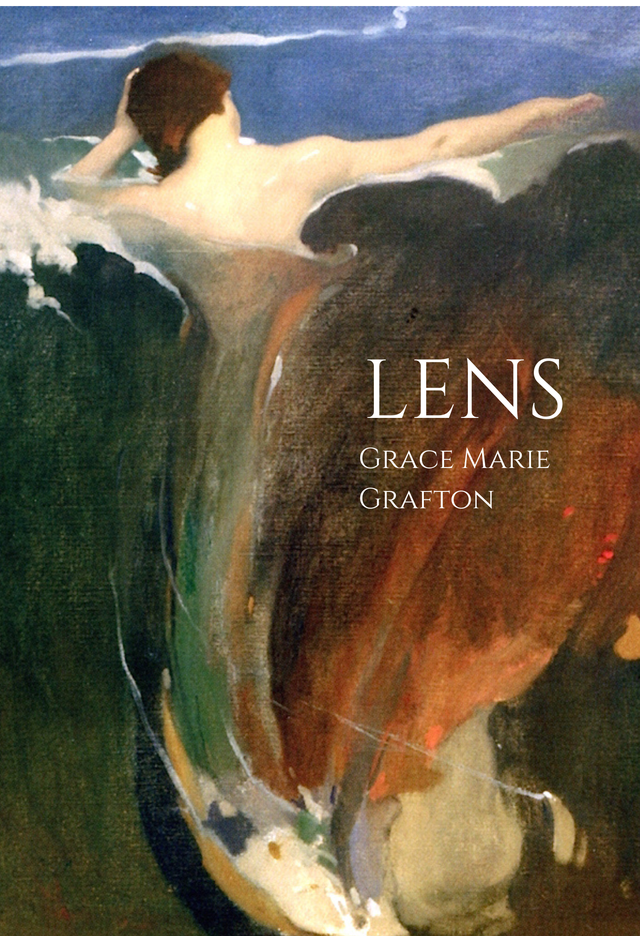- Poetry
- >
- LENS by Grace Marie Grafton
LENS by Grace Marie Grafton
Unique and commonplace, wise and funny, wild and cultivated, the poems in LENS, by Grace Marie Grafton, invite readers to explore with her the faces, places, history and mythic imagination of artists of California from 1853-2010.
These quixotic, skillful poems display a sensitive respect for the art that inspired them. The author has selected sixty six pieces of artwork that collectively display the astounding breadth of art that California has evoked and that therefore afford her sufficient content to showcase her mastery of a refreshing variety of writing styles. As her poem, “Muse,” from LENS, says, “she could spell the letters in summer shapes/ she could hold you down in a fight/ she unlocks the midnight door for you.” Her poems will help you see art, poetry and California through a new lens.
Rather than describe the content of a painting, Grafton uses any given piece of art as a launching pad for imaginative excursions that are creative and frequently surprising. The reader accompanies her into the Sierra Nevada, the redwoods, the beach, coastal hills, valley farms, orchards, Depression-era streets, an internment camp, the weather. In response to figurative art, she writes narratively. With surreal art, a reader’s mind is opened. With abstract art, her poem might be associative or break all over the page.
Welcome to the historical, environmental and artistic richness of California and Ms. Grafton’s adventuresome poems.
Details
Genre: Poetry
ISBN:978-1-950730-05-6
Publication Date: July 23, 2019
Reviews
These landscape-swept poems cross California in time and place. They trace histories of discovery, wildness, change, habitation, struggle, destruction. Knowledge, sorrow, wonder. They hold up a lens, creating a conversation between visual artists, the poet, and place in arresting and flexible language. Each poem is a close look—clear, honest, graceful—and reading them, you will be reminded of what makes place so deeply meaningful to us all. The book is a paean to the nature and majesty of California, to the peoples and animals that have lived within her changing, rich landscape, and to the importance of knowledge, contemplation and art.
--Tobey Hiller, Aqueduct
Grace Grafton's luminous new collection of poems is a tribute to California artists from the mid-19th century through the present day. Lens could and should serve as a textbook definition of ekphrasis. Not one iota of beauty escapes the poet's eye. In spare language that radiates joy, she makes the landscapes and stories of these visual works so vivid that we feel convinced we've seen them with our own eyes.
--Barbara Quick, Vivaldi's Virgins
Jordan Kantor has written that the denotative function of language is kin, in representational painting, to the way that what is pictured in the painting is foregrounded. As I read Grace Marie Grafton’s luminous and illuminating poems, I see this concept come to life; I see how Grafton begins with her deft translations of what is represented in the art, i.e., the denotative, the powerful gravity of what appears before a viewer’s eye in the artwork. This, she must work both with and against, using her enormously muscular and yet exceedingly well-calibrated craft. In this way her work can soar high above this gravity, but never so far as to leave it out of our sight or mind or leave behind its hold upon the meaning of each poem. This is deft trapeze artistry, practiced without a net. As a reader, I never forget that each reach of image that she takes, each risk, might, in less-skilled hands, plummet earthward and land as a shamble of failure upon our eyes and ears. Yet Grafton’s images remain aloft in meticulously-timed arcs of direct language, which are without embellishment. All is muscle, compelling our eyes to follow her in fear and in delight, as we are given exacting language we then can translate into viscerally visual images in our minds. She risks in this way, her approach resists offering easy explanation or interpretation. She offers us the gift of gathering from the work our own insight, our own complex interpretations of what we see through her powerfully concentrated poems, her LENS.
--Rusty Morrison, Beyond the Chainlink
